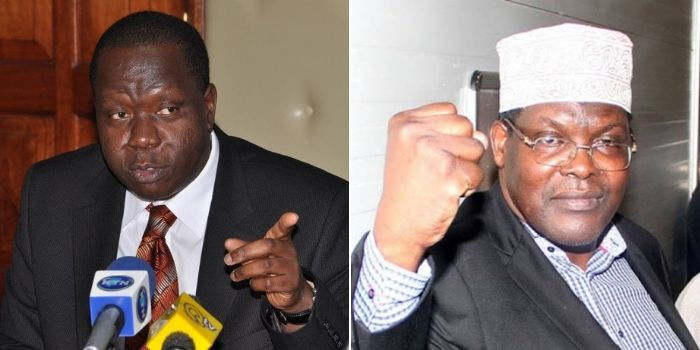Court Grants Matiang’i Victory in Miguna Miguna Deportation Case
Former Interior Cabinet Secretary Fred Matiang’i has won an important round in his long-running legal battle with exiled lawyer Miguna Miguna after the Court of Appeal overturned a contempt of court verdict that had been hanging over him.
In a ruling delivered on Friday, September 19, appellate judges cleared Matiang’i, former Inspector General of Police Joseph Boinnet, and former Immigration boss Gordon Kihalangwa of contempt charges that had been imposed by the High Court in 2018.
The three had been fined Ksh200,000 each for allegedly disobeying a court order to free Miguna from detention at Jomo Kenyatta International Airport (JKIA). The appellate court not only set aside the fines but also ruled that the earlier conviction itself was flawed.
Why the Court Overturned the Verdict
The Court of Appeal explained that Justice George Odunga, who presided over the case at the time, imposed the contempt verdict without following the correct legal procedure.
According to the judges, the contempt finding was issued without a formal application being filed in court, as required under the law. Instead, the High Court acted on what they described as an “oral application from the bar” and relied on inherent jurisdiction to reach its decision.
The appellate bench emphasized that while courts have powers to protect their authority and enforce orders, penal sanctions such as fines or contempt convictions cannot be sustained without proper motions and due process safeguards.
“Our decision is not an endorsement of disobedience of court orders,” the judges clarified. “Rather, it is confined to the issue of procedure. The sanctions issued on 28th and 29th March 2018 could not stand without a formal motion and the observance of safeguards required in contempt proceedings.”
Background of the Dispute
The case dates back to March 2018, shortly after Miguna Miguna attempted to re-enter Kenya following his controversial deportation in February that same year. Miguna argued that he was a Kenyan citizen by birth and held valid travel documents. He also pointed to court orders directing the government to facilitate his return.
However, when he landed at JKIA, Miguna claimed he was held at Terminal 2 by armed security officers who confiscated his passport and attempted to force him onto a flight out of the country.
His lawyers quickly moved to the High Court, where Justice Odunga issued an urgent order directing the authorities to produce Miguna before the court.
When that order was allegedly ignored, the judge declared that Matiang’i, Boinnet, and Kihalangwa had violated Article 10 of the Constitution, which upholds national values and the rule of law. He then imposed personal fines to be deducted directly from their salaries, citing blatant disobedience of lawful court instructions.
Arguments from Both Sides
Matiang’i and the other senior officials maintained that the High Court overstepped its mandate by acting without a proper contempt application. Their lawyers argued that Justice Odunga relied on inherent jurisdiction instead of the Contempt of Court Act, which was in force at the time, thereby denying them fair procedure.
On the other hand, Miguna’s legal team insisted that the High Court was right to act decisively in order to protect its authority.
They pointed out that the orders had been formally served on the State and widely publicized, including being posted at JKIA and circulated through official social media accounts. According to them, the officials had no excuse for failing to comply.
What the Ruling Means
While the appellate court’s ruling clears Matiang’i, Boinnet, and Kihalangwa of contempt liability, it does not erase the fact that Miguna’s re-entry saga highlighted deep conflicts between the State and the judiciary at the time.
The judges carefully noted that their verdict did not condone defiance of court orders, stressing that respect for judicial authority remains a cornerstone of constitutional governance.
In effect, the ruling delivers relief to the former top officials, who no longer face financial penalties or a stain on their records from the contempt finding.
However, it also rekindles debate over how Kenyan courts should balance the urgent need to enforce compliance with the requirement to observe due legal process in contempt cases.
Join Government Official WhatsApp Channel To Stay Updated On time
https://whatsapp.com/channel/0029VaWT5gSGufImU8R0DO30


